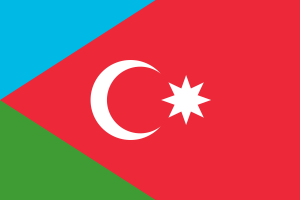Language/South-azerbaijani/Grammar/Comparatives-and-Superlatives
| ◀️ Adjective Agreement — Previous Lesson | Next Lesson — Adverbs of Time, Manner, and Place ▶️ |
Welcome to our lesson on Comparatives and Superlatives in South Azerbaijani! This topic is essential for anyone looking to enhance their language skills, as it allows you to express differences and similarities between people, objects, and ideas. Whether you're comparing two friends, describing the size of a house, or talking about your favorite foods, understanding how to use comparatives and superlatives will enable you to communicate more effectively and enrich your conversations.
In this lesson, we will cover:
- What comparatives and superlatives are
- How to form comparatives and superlatives in South Azerbaijani
- Examples of comparatives and superlatives in everyday contexts
- Exercises to practice your understanding
By the end of this lesson, you will have a solid foundation in using comparatives and superlatives, making your South Azerbaijani communication more dynamic and expressive.
Understanding Comparatives and Superlatives
Comparatives and superlatives are used to compare two or more things.
- Comparatives are used when comparing two entities (e.g., "A is taller than B").
- Superlatives are used to express the highest degree of a quality among three or more entities (e.g., "A is the tallest of all").
In South Azerbaijani, the formation of comparatives and superlatives often involves the use of specific suffixes or words that modify adjectives.
Forming Comparatives
To create comparatives in South Azerbaijani, we typically add the suffix -dān to the adjective. This suffix translates to "than" in English.
Here’s a general structure:
- Adjective + -dān (than)
Examples of Comparatives
Let's take a closer look at some examples of comparatives in South Azerbaijani:
| South Azerbaijani | Pronunciation | English |
|---|---|---|
| uzun-dān | uzundɑn | taller than |
| kiçik-dān | kiʧikdɑn | smaller than |
| gözəl-dān | gøzæl dɑn | more beautiful than |
| zəif-dān | zæifdæn | weaker than |
| şirin-dān | ʃirin dɑn | sweeter than |
| ağıllı-dān | ɑɯɯlɯdɑn | smarter than |
| sürətli-dān | syretlidān | faster than |
| bahalı-dān | bɑhɑlɯdɑn | more expensive than |
| sevgi-dān | seʋgidan | more loved than |
| çirkin-dān | ʧirkindɑn | uglier than |
Forming Superlatives
Superlatives in South Azerbaijani are generally formed by adding the prefix ən to the adjective.
Here’s a general structure:
- ən + Adjective (the most)
Examples of Superlatives
Now, let's see some examples of superlatives in South Azerbaijani:
| South Azerbaijani | Pronunciation | English |
|---|---|---|
| ən uzun | ən uzund | the tallest |
| ən kiçik | ən kiʧik | the smallest |
| ən gözəl | ən gøzæl | the most beautiful |
| ən zəif | ən zæif | the weakest |
| ən şirin | ən ʃirin | the sweetest |
| ən ağıllı | ən ɑɯɯlɯ | the smartest |
| ən sürətli | ən syretli | the fastest |
| ən bahalı | ən bɑhɑlɯ | the most expensive |
| ən sevilən | ən sevilən | the most loved |
| ən çirkin | ən ʧirkɪn | the ugliest |
Summary of Key Points
- Comparatives are formed with -dān (than).
- Superlatives are formed with ən (the most).
This structure allows South Azerbaijani speakers to express relative differences and absolute extremes in qualities easily.
Exercises
Now that you have learned how to form comparatives and superlatives, it’s time to practice! Below are ten exercises designed to reinforce your understanding:
Exercise 1: Fill in the Blanks
Complete the sentences with the correct comparative form of the adjectives in parentheses.
1. Ali is __________ (tall) __________ Reza.
2. This book is __________ (interesting) __________ the other books.
3. My car is __________ (fast) __________ your car.
Exercise 2: Translate the Sentences
Translate the following sentences into South Azerbaijani using comparatives.
1. This house is bigger than that house.
2. She is more intelligent than her brother.
3. My dog is friendlier than your dog.
Exercise 3: Form Superlatives
Write the superlative form of the adjectives given.
1. beautiful → __________
2. fast → __________
3. expensive → __________
Exercise 4: Multiple Choice
Choose the correct answer to complete the sentences.
1. This is the __________ (tall/taller) building in the city.
2. She is __________ (smarter/smart) than him.
3. This dress is __________ (more beautiful/beautiful) than that one.
Exercise 5: Create Your Own Sentences
Write three sentences using comparatives and three sentences using superlatives about your family or friends.
Solutions to Exercises
Here are the solutions to the exercises provided:
Solution to Exercise 1
1. Ali is uzun-dān Reza.
2. This book is maraqlı-dān the other books.
3. My car is sürətli-dān your car.
Solution to Exercise 2
1. Bu ev o evdən böyük-dān.
2. O, qardaşından ağıllı-dān.
3. Mənim itim sənin itin-dən dostluq.
Solution to Exercise 3
1. ən gözəl
2. ən sürətli
3. ən bahalı
Solution to Exercise 4
1. This is the tall building in the city.
2. She is smarter than him.
3. This dress is more beautiful than that one.
Solution to Exercise 5
(NOTE: Students should provide their own sentences based on their context.)
Congratulations on completing the lesson! Practice is key, so make sure to utilize comparatives and superlatives in your conversations to strengthen your grasp of the language. Keep practicing, and you will see improvement!
Other Lessons
- How to Use Be
- Gender
- Conditional Mood
- Plurals
- Past Tense
- Give your Opinion
- Negation
- Questions
- Adverbs of Time, Manner, and Place
Template:South-azerbaijani-Page-Bottom
| ◀️ Adjective Agreement — Previous Lesson | Next Lesson — Adverbs of Time, Manner, and Place ▶️ |

